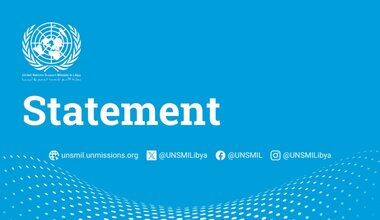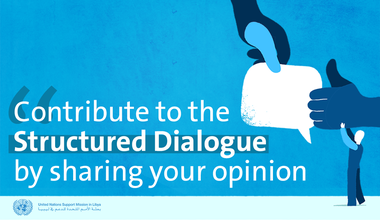Basirah panel discussion: Journalists play key role in the political process as educators and truth tellers
TRIPOLI — Journalism has an essential role to play in the political process, agreed participants in a panel discussion on 18 September facilitated by the United Nations Support Mission in Libya, including educating the public, providing a forum for constructive dialogue, excavating corruption, and holding leaders accountable.
“The failure of media is the failure of society,” said Mahmoud Shammam, the head of Al Wasat Media Group.
Shammam, along with Ibrahim Hadia, the general director of the Libyan News Agency (LANA), and Zeinab Tarbah, a freelance journalist and the owner of the Towards a Solution Media Initiative, were the panelists for the online event, which was organized under the Basirah program for media professionals. UNSMIL Spokesperson Mohammed Al-Asaadi moderated the dialogue, which also examined the challenges of neutrality and combatting hate speech, misinformation, and disinformation. Thirty-nine members of the journalism community from across Libya attended, including representatives from Ajwa Media, Libyan Organisation for Independent Media, and Libya FM.
Hadia described journalism’s role in the political process as “a bridge between the citizen and the authorities.”
“A journalist is not merely a news carrier,” he said. “Rather, they are an educator that helps the public understand what is happening.”
While electoral laws and constitutional disputes are some of the key issues preventing elections from moving forward, panellists said, many Libyans don’t understand them.
From the audience, Yassin Al-Hassouni elaborated: “What is a civil state? What is a voter? What is a constitution? For 42 years these concepts have been absent from the public’s understanding. It is the media’s role to fill in the gaps.”
Key points of the panellists’ discussion with attendees included the need to strengthen research methods and maintain neutrality in a highly polarised environment.
“The journalist must stand firm so that they don’t become a proponent of a specific political narrative," Shammam said, adding that, “politics permeates everything” from access to basic services, to hospitals, to schools, to jobs.
Hadia stressed the importance of confirming information: “You have to contact one source, then another, and another.”
Attendee Mansour Atif, contributing to the exchange, agreed, calling for “more voices working to expose corruption and human rights violations.”
“There is no political process without the press as an integral part of it,” Atif said. “We know that the political process in Libya is almost non-existent, so one of the most important tasks the press should focus on is monitoring and holding authorities accountable.”
Libyan media coverage often does not comply with these ideals, however.
The media has become “preoccupied” with covering the narratives crafted by various political factions, Tarbah said. This is presented as “news”. Then political analysts — who also have political bias — are brought on to discuss, resulting in “a shouting match on air.”
“The citizen doesn’t benefit,” she said. “This vicious cycle has led us, as media professionals, to neglect urgent issues, like the path towards establishing the Libyan state. We don’t create national narratives — we recycle them.”
Part of the problem, Shammam said, is the division in society itself, emphasising that it is not only journalism that is failing.
“Art in Libya is over. Sports in Libya are over. The schools are collapsing. Civil society is struggling. Institutions are corrupted,” he said. “We have to face ourselves and say, ‘We have made a lot of mistakes,’ or else our children will be lost. It is a social battle before it is a political battle.”
He also pointed to a lack of ethics training and capacity building opportunities for media professionals and a nationwide code of conduct.
“We have journalists, but we don’t have journalism,” he said, recalling the “four dark decades” when a single, state narrative prevailed. “To strengthen journalistic professionalism, we must create a generation that is well trained. They must learn theoretically and practically. They cannot learn simply by being thrown into the real world.”
The media also works under threat of physical attacks, online harassment, and reputational sabotage, the panellists discussed with the audience. Laws don’t protect journalists; rather, dozens of provisions in the penal code can be used to prosecute them.
Likening carrying a camera on the street — or even filming with a mobile phone — to carrying an “AK-47 or an RPG launcher,” Hadia said, “it is extremely difficult to obtain information during times of conflict, and verifying the credibility of information is a major challenge.”
Media outlets are funded by external actors, political parties, or armed groups, which, panellists and attendees concurred, limits space for freedom of speech and fuels division.
“Anyone who stands up, speaks out boldly, honestly, and sincerely is a potential martyr," Shammam said. “Not a writer or a radio broadcaster — but a potential martyr — if they dissent.”
With the audience, the panellists brainstormed potential ways forward: training centres, a legal framework to protect journalists, strengthening national fact-checking initiatives, and professional certification. One participant suggested establishing a public fund to support independent media projects and programmes without directly controlling them.
“There need to be professional standards and controls to address hate speech, incitement, and disinformation,” said Reda Fhelboom, one of the participants. “If you ask any journalist, ‘What is defamation?’, they don’t understand. The laws must be there before people can abide by them.”
But, ultimately, as Tarbah pointed out, “repair takes years.”
“Today we are in an emergency situation,” she said. “The priority for Libya today is to reach a consensual way forward with the political process. Because if the next stage fails, it fails the media as well. We have to ask ourselves: What will be our role in it?”
Basirah is the Mission’s ongoing professional development programme for Libyan media professionals, including journalists, media professors and students, and fact checkers. It was developed to build the sector’s capacity to combat the spread of misinformation and disinformation. Since its launch in May 2025, the programme has addressed topics ranging from artificial intelligence to journalist safety to digital research.
To join, fill out this form: Link
 United Nations Peacekeeping
United Nations Peacekeeping UN
UN









